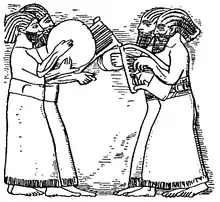King Biba
Edward Yousif (1945 – November 27, 1995), mostly known by his stage name as King Biba, was an Assyrian singer and entertainer renowned for his vibrant voice and theatrical stage presence. His career spanned 30 years, starting from the early 1960s – making him one of the first prominent Assyrian singers to produce records and sing onstage, alongside Evin Agassi – up until the late 1980s. He innovated a new style of Assyrian music, which was a blend of keyboard instruments, guitars and drums.[1]
King Biba | |
|---|---|
 Biba performing in the early 1980s | |
| Background information | |
| Birth name | Edward Yousif |
| Born | 1945 Baghdad, Iraq |
| Origin | Chicago, United States |
| Died | November 27, 1995 (aged 49–50) |
| Genres | Assyrian music, sentimental ballads |
| Occupation(s) | Singer |
| Years active | 1962–1995 |
Biography
Edward Yousif started to sing in both Assyrian and Iraqi gatherings from the age of 11. In his inception, he only sung in Arabic, imitating his idol Farid Al Atrash, a famous Syrian-Egyptian singer. Influenced by Assyrian singer Oshana Youel Mirza, Biba ultimately began to sing in the Assyrian language in 1961 on stage, where he became an instant sensation and adopted his stage name "Biba".
A pioneer of his kind, he and musician George Ishu endeavored to bring to life a new type of music sound, stating, "We did not want to imitate Western music...We wanted to continue in the path of Eastern music, but possess a new sound, provide a new dimension".[1]
In 1965, the president of Iraq Abdul Salam Arif congratulated Biba with a gold watch in honor of him winning a singing competition on television. From 1962 to 1979, Biba made frequent appearances on Iraqi television. In the 1980s, Biba produced his first studio albums, and continued singing in concert parties and weddings until the early 1990s, before he became ill with alcoholic liver disease, and eventually succumbing to his illness in 1995. Late Biba resided in Chicago with his wife and daughter Krystal. He is laid to rest in Montrose Cemetery in Chicago.[1]
Legacy
Other Iraqi ethnic groups, such as the Arabs, Kurds, and Turkmens admired his songs, buying his merchandise. His 1962 live recording of song, Qurba Al Aynati' ("Close to m My Eyes"), became a hit for its lyrics, fresh melody, and the fact that it was an expression on Biba's life experience, such as his first love. In a time frame of six months in 1962, Biba sold over 5,600 records in Iraq and 12,000 were subsequently produced and sold in Iran.
In present times, his 1960s songs Mokhibee Sogul ("Dearly Beloved") and Saperchewin ("I'm a Wanderer") are extant in spirit and considered classics, and would remain to be one of the most covered ballads on stage, which are usually performed in weddings and would accompany slow dances.[1]
Discography
To note, his 1960s albums were live recordings which consisted of two songs.
- Qurba Min Aynati (1962)
- Mani Mirreh (1962)
- Jwelta B Dimy (1967)
- Atur Gabarta (1974) (Studio album)
- Nineveh M Deeti (1984) (Studio album)
- Brata D Nineveh (1987) (Studio album)
- Memories of Biba (1993) (Compilation album)
References
- "Biba – Qeenatha – Home of Assyrian Music". Qeenatha.com. Retrieved October 9, 2018.
